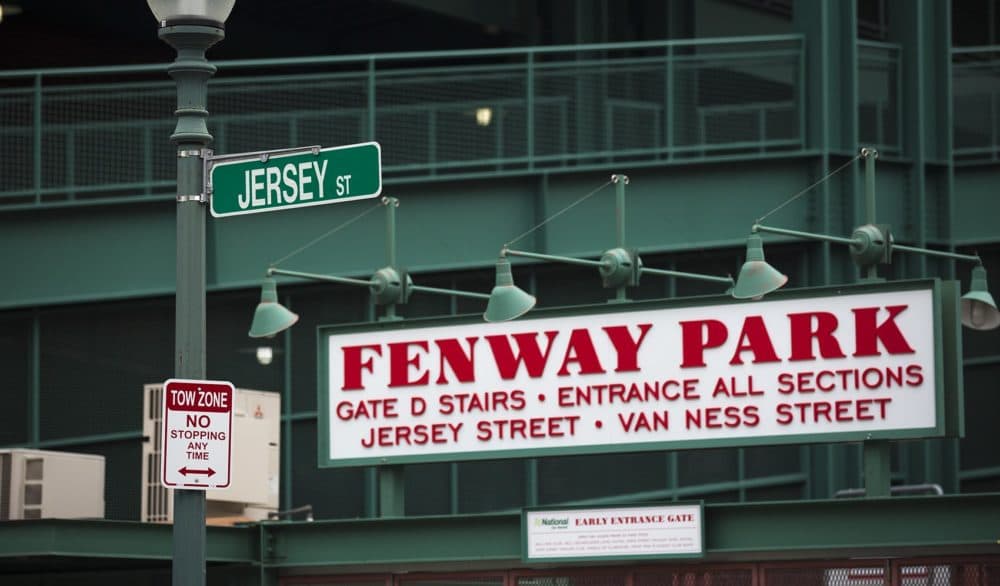Advertisement
Are The Red Sox Turning The Corner On Race? It's Complicated

It's lunchtime in Roxbury's Dudley Square — the historical center of Boston’s black community — on Thursday, the day after the Red Sox took Game 2 of the World Series.
Activist Segun Idowu cracks open his laptop before talking about an admittedly awkward subject: the intersection between Boston blacks and the Boston Red Sox.
Idowu, who lives in Hyde Park, says in his community, it’s always been clear which sports take precedence, and baseball isn't one of them.
"You find a random young black boy on the street and ask him what he wants to be [and] it will most likely be a football player or a basketball player," he says. "You very rarely hear, 'I want to be a baseball player' or 'I want to play for the Bruins.' "
Baseball is known as "America’s pastime." But Idowu questions whether that includes Americans like him.
“For a long time it was white America's pastime, not the whole country," he says. "And so I think the fact that it was always seen as the white man's sport is when you saw a lot of the backlash when it had to be integrated.”
The Red Sox were the last to integrate, a fact that has dogged the organization ever since. That may have been more than a half century ago, but it's a topic that remains alive and well in this city of champions.
The Red Sox faced a public relations disaster last season, when Baltimore Orioles outfielder Adam Jones was subjected to racist taunts from the stands. For the Sox it was a wake-up call.
"What we've tried to do is make diversity and inclusion increasingly important from day one," says Red Sox Chief Marketing Officer Adam Grossman, referring to the current ownership group. "But I think the Jones incident allowed us to hone in even more and sort of take that to a different level."
After the Jones incident the team launched a new initiative with the NAACP and the other four major sports teams in the region. It’s called Take The Lead, an attempt to do away with racism in stadiums and to diversify the organizations.
Advertisement
More recently, the Red Sox threw their weight behind a controversial effort to drop the name of the former Yawkey Way, drawing opposition from an array of power brokers, and praise from civil rights groups.
Idowu — who heads the Boston Police Camera Action Team, which advocates for police to wear body cameras — says the Sox's position on Yawkey Way was a good look on the team.
"It definitely put a good light on the Red Sox leadership and management for leading the charge to change the name and to correct the mistakes of the past," he says.
But Idowu says if Boston blacks are to move closer to the Red Sox, it's going to take time, and efforts like Take The Lead and the Yawkey Way fight have to be ongoing.
"It's a generational thing," he says. "We weren't always into basketball, we weren't always into football, but now those are the chief sports that we participate in and watch and cheer on. I think eventually we'll get there with baseball as well."
Whether there's been progress on the team's relationship to nonwhite people is hard to quantify. Red Sox officials say 23 percent of their employees are people of color, which is only slightly higher than the rest of Major League Baseball.
As for the front office staff, the team says it doesn’t have data readily available. Nor do the Red Sox track the racial makeup of the fanbase.
One thing the team can control, Grossman says, is the image put out to the public.
“The teams have the platform and the visibility to to try to change that perception," he says. "And again we can't do all of it. But what we can control, going back to the work that we've done in our venue, that's something that we can control.”
If black Bostonians prefer the Celtics over the Red Sox, perhaps that goes back to the fact that the Celtics were the first in the NBA to draft a black player, while the Red Sox were the last team in the MLB to integrate.
And while the Celtics have the most championships among NBA teams, the Red Sox’s 86-year World Series drought ended thanks largely to a cast of Dominican All Stars: Manny Ramirez, Pedro Martinez and Big Papi, David Ortiz.
Some say the Curse of the Bambino was really the curse of racism.
Born and raised in Boston, sports commentator Dart Adams says this year’s team — with a Puerto Rican manager, players from an array of backgrounds and a very successful season — could change the way people of color see the Red Sox.
"People can usually hate on anything Boston and relate it to, ‘Oh, Boston is a racist city,' " he says. "But when you look at the Red Sox roster, and you look at the people that they've plugged in at certain points in the game ... it's hard to root against them."
But is it fair to put the reputation of a city on the shoulders of its baseball team?
Donna Latson Gittens is a longtime consultant to the Red Sox, and part of the Take The Lead initiative.
"It's not just the Boston Red Sox; the rest of the city is changing," she says. "And oh by the way, this race narrative didn't happen overnight and it's not going to end overnight. It's going to take some time."
Gittens says there’s still a long way to go before racism is run out of Fenway Park. But she says the change, as incremental as it may be, is clearly underway.
This segment aired on October 26, 2018.

